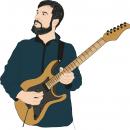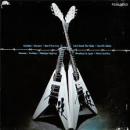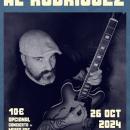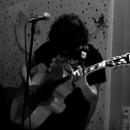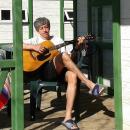Fue uno de los mejores compositores de guitarra clásica,.. pero,.. alguno de ustedes ha oído hablar de él???
http://es.wikipedia.org/wiki/Agust%C3%ADn_P%C3%ADo_Barrios
http://www.delphica.dk/pages/Barp.htm
Barrios Mangoré, Agusto 1885-1944
Un sueño en la foresta
Una limosna por el Amor de Dios
Vals op. 8 no. 3
back
From Wikipedia, the free encyclopedia:
Agustín Pío Barrios (also known as Agustín Barrios Mangoré) (born May 5, 1885 in San Juan Bautista de las Missiones, Paraguay; died August 7, 1944) was a Paraguayan guitarist and composer.
When he was a child, Barrios began to develop a love for music and literature, two areas that were very important to his family. Barrios-Mangoré eventually would speak two different languages (Spanish and Guarani), and read three more (English, French and German).
Barrios began showing interest in musical instruments, particularly the guitar, before he reached teenagehood. He went to Asuncion in 1901, at the young age of thirteen, to attend Colegio Nacional de Asuncion, with a scholarship in music, thus becoming one of the youngest university students in Paraguayan history. Apart from becoming a musician at the college's music department, Barrios-Mangoré was also well appreciated by members of the college's mathematics, journalism and literature department members.
After leaving college, Barrios dedicated his life to writing poems and practising his music. He arranged more than 300 songs which he would write in poem, then play with his guitar. Barrios-Mangoré made several friends during his multiple trips across South America; he was known for giving his friends and fans signed copies of his poems. Because of that, a sizeable amount of different versions of his works have surfaced across that continent and in other areas of Latin America as well as in the United States, for which many of his current fans warn potential copy buyers to be careful when they are to buy a poem reportedly written by Barrios-Mangoré.
Barrios was famed for his phenomenal performances, both live and on gramophone recordings — the first classical guitar music ever committed to disk. For some years, it was his habit to perform in concert in traditional Paraguayan dress (he was partly of Guarani origin).
His works were largely late-Romantic in character, despite his having lived well into the twentieth century. Many of them are also adaptations of or are influenced by South American and Central American folk music. Very many of them are of a virtuosic nature.
The Bach-inspired La Catedral (1921) is often considered to be his most impressive work, even winning the approval of Andrés Segovia, who otherwise seemed to have little regard for his compositions. The posthumous rise in Barrios' critical stock, both as composer and player, is seen by some to have come at the expense of Segovia,
formerly an untouchable icon of the instrument.
Barrios died and was buried in San Salvador on August 7, 1944.
Barrios-Mangoré is still revered in Paraguay, where he is still seen as one of the greatest musicians of all time by many. His works have been championed by John Williams, among others, as some of the greatest in the classical guitar repertoire. Williams has said of Barrios: As a guitarist/composer, Barrios is the best of the lot, regardless of ear. His music is better formed, it's more poetic, it's more everything! And it's more of all those things in a timeless way. So I think he's a more significant composer than Sor or Giuliani, and more significant composer — for the guitar — than Villa-Lobos. 
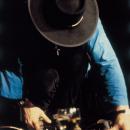








 ).
).

